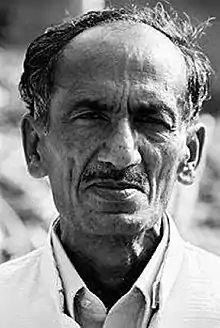Ali Arshad Mir
Ali Arshad Mir (Punjabi: علی ارشد میر; 1 January 1951 – 16 October 2008) was a Pakistani epic poet and writer of the Punjabi language, oftenly described as the "Homer of Punjab".[1] His works have been translated into languages such as Urdu and English. In the 1970s, his International Anthem brought him recognition. His lines like "Girti huyi deewaro'n ko aik dhaka aur do" (Urdu: گرتی ہوئی دیوارون کو ایک دھکا اور دو; Give the falling walls one more push) are a popular slogan in Pakistan and around the world. His work includes dozens of poems that depict the socio-economic condition of society's oppressed people.[2]
Ali Arshad Mir | |
|---|---|
| علی ارشد میر | |
 Photograph of Arshad Mir | |
| Born | 1 January 1951 |
| Died | 16 October 2008 (aged 57) |
| Resting place | Chishtian, Punjab, Pakistan |
| Other names | Homer of Punjab |
| Education | M.A. in Punjabi |
| Occupations | |
| Part of a series on |
| Punjabis |
|---|
 |
_with_cities.png.webp) Punjab portal |
Personal life
Ali Arshad was born in a Muslim family in a Chishtian district, 250 km away from Lahore, Punjab, Pakistan. He completed his M.A. in Punjabi language, and was appointed as an Associate Professor in Government M.A.O College Lahore. Later, he joined Government Degree College Depalpur, Okara as its Principal.[3] He also worked with Mazdoor Kissan Party. He was a dervish, down to earth and straightforward man who would never go for flattery for any favours or for compromises. That’s why he was transferred 26 times during his educational career as an educationist. He was also a great activist who always raised a voice for rights of workers and those pushed to the margins of society [4]
Major works
Mir Sahab wrote his first work of poetry at the age of 16 and was considered an "Inqilabi", or profound poet, from a very early age.[5] He dedicated his life to the depiction of the suffering of the underprivileged. His poems are considered a source of inspiration for oppressed people.[6] In the 1970s, he wrote the revolutionary international anthem, "Girti hui deewaro ko aik dhaka aur do",[7] which remains a popular slogan used in rebellions. In the same era, he wrote a Pakistani shadow play, Ravi Sy Bias Tak. He compiled the posthumous work of Ustad Daman and named it Daman Daye Moti.[8]
Kaifi Azmi translated Mir's poems to Urdu. Waheed Ahmed[9]'s poem "khana badosh", considered a major Urdu work, was derived from Mir Sahab's epic poem "Gawathi Katha di War".
Legacy
Mir Sahab died in October 2008.[10] His last words were "nazam kuj chair baad samny ay gee" and he rests in Bahawalnagar Punjab, Pakistan.[11]
His literary work was published posthumously. His book Ik Katha De War consists of autobiographical notes about his life, beliefs and teachings. The play Ravi Sy Bias Tak is included in the syllabus of National College of Arts.
Every year, the Mir Foundation organizes Punjabi Mela,[12][13] an event that consists of poets and people associated with Punjabi literature paying Mir tribute by organizing his works.[14][15][16] In 2018, First Dalit Mela was organized by Mir foundation and MNS University of Agriculture which depicted hardship, life and culture of lower caste Hindus residing in Pakistan,[17] it had several events and dramatized plays based on works of prominent writers like Munshi Premchand.[18][19][20] The festival has a lot to offer including literary sessions, performances, stalls and last but not the least food-for-thought conversations by various speakers. The festival also has several books and handicrafts stalls promoting cultural diversity and education.[21]
References
- "Glowing Tributes for Arshad Mir". Archived from the original on 2013-10-04. Retrieved 2013-10-01.
- Punjabi bohemian poet
- Famous poet Ali Arshad Mir
- Life of Ali Arshad Mir
- Professor Mir
- Daily Aaj Kal Newspaper report Archived 2013-10-04 at the Wayback Machine
- Benazir Bhutto in jacobabad on YouTube
- Ali Arshad Mir national writers
- "Dr. Waheed Ahmed". Archived from the original on 2013-10-02. Retrieved 2013-09-30.
- Ali Mir sahab Remembered
- Homer of Punjab on YouTube
- "Pakistan Defense". Archived from the original on 2013-10-05. Retrieved 2013-10-01.
- 9th Punjabi Mela
- 3rd Punjabi Mela on YouTube
- "Daily Times". Archived from the original on 2013-10-04. Retrieved 2013-10-01.
- Poet Prof Ali Arshad Mir Condolence Seminar on YouTube
- First Dalit Mela
- 10th Punjabi Mela
- 11th Punjabi Mela
- Mir Punjab Mela
- Mir Punjabi Festival Kicks off